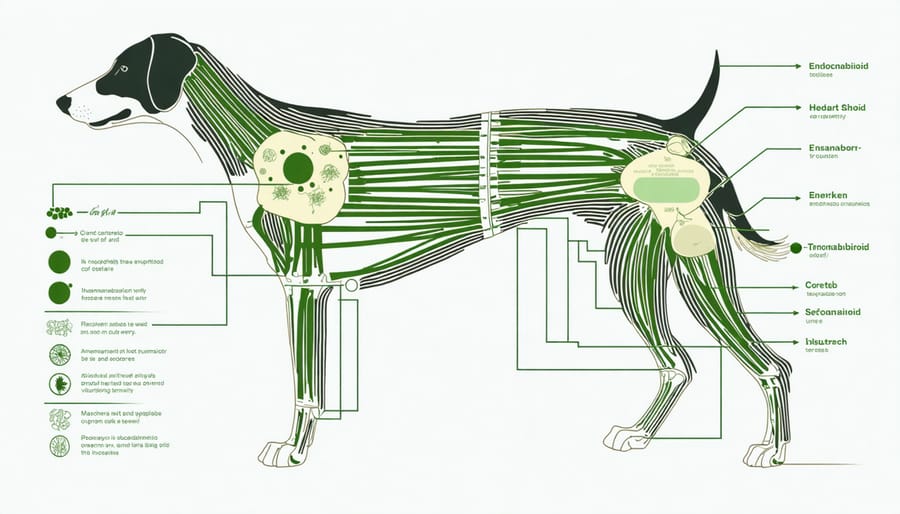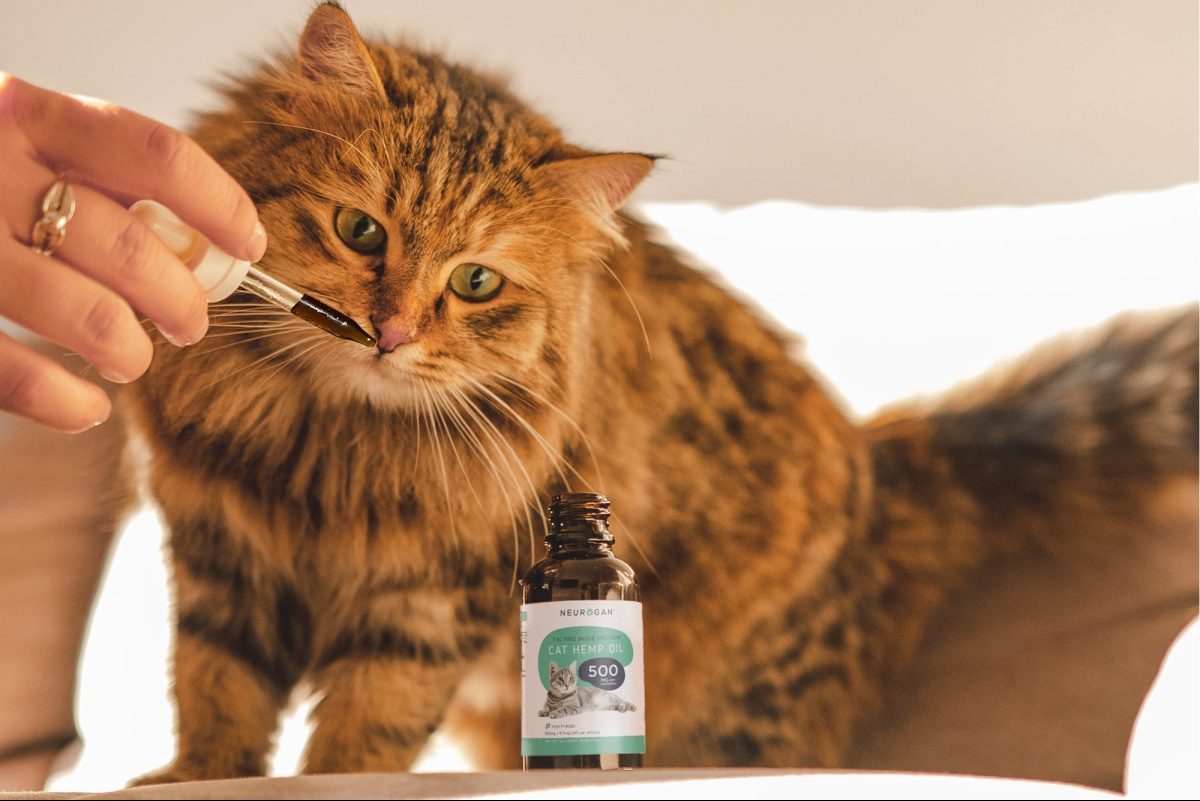CBD oil has emerged as a groundbreaking natural supplement for pets, offering relief from anxiety, chronic pain, and inflammation, according to recent veterinary research. At CBDNorth, we’ve seen countless success stories of pets experiencing improved quality of life through carefully administered CBD treatments.
As pet owners increasingly seek holistic solutions for their companions’ wellbeing, CBD oil stands out for its versatility and effectiveness. Studies show that CBD interacts with pets’ endocannabinoid systems similarly to humans, helping regulate crucial functions like mood, sleep, and immune response. This natural compound has demonstrated remarkable potential in managing various conditions, from arthritis in senior dogs to stress-related behaviors in cats.
While traditional medications certainly have their place, CBD offers a gentle yet powerful alternative that works with your pet’s body to promote balance and healing. Whether you’re dealing with an anxious puppy or an aging companion struggling with mobility, understanding CBD’s benefits could open new doors for your pet’s health journey.
How CBD Oil Works in Your Pet’s Body
The Science Behind Pet CBD
CBD works by interacting with your pet’s endocannabinoid system (ECS), a complex network of receptors found throughout the body. This system plays a crucial role in maintaining balance across various biological functions, including mood, pain sensation, immune response, and inflammation.
When CBD enters your pet’s body, it primarily engages with two types of receptors: CB1 and CB2. CB1 receptors are predominantly found in the brain and nervous system, while CB2 receptors are concentrated in immune cells and peripheral organs. Unlike THC, CBD doesn’t directly bind to these receptors but instead modulates their activity and influences the body’s natural endocannabinoid production.
This interaction helps explain why CBD can affect multiple aspects of your pet’s health simultaneously. For example, by regulating inflammatory responses and pain signaling pathways, CBD may help reduce discomfort in arthritic pets. Similarly, its influence on serotonin receptors could explain its calming effects on anxious animals.
The beauty of this system is that it’s present in all mammals, which is why CBD can benefit both humans and pets alike.

Safety Profile for Pets
Research consistently shows that the safety profile of CBD is favorable for most pets, including dogs, cats, and horses. Studies indicate that pets generally tolerate CBD well, with minimal side effects when administered at appropriate dosages. Common mild reactions may include drowsiness, dry mouth, or temporary changes in appetite, which typically resolve on their own.
However, safety considerations vary by species and individual animal characteristics. Dogs appear to metabolize CBD differently than cats, and smaller pets require more precise dosing. Senior pets or those with existing health conditions may need special consideration and veterinary guidance before starting CBD supplementation.
While CBD is non-toxic, it’s essential to use products specifically formulated for pets and to start with low doses. Quality matters significantly – pet owners should choose CBD products that are third-party tested and free from harmful additives like xylitol. Regular monitoring of your pet’s response and consultation with a veterinarian can help ensure safe, effective use of CBD supplements.
Proven Health Benefits for Pets
Pain Management and Mobility
CBD oil has shown promising results in managing pain and improving mobility in pets, particularly those suffering from arthritis and joint issues. Studies suggest that CBD interacts with the endocannabinoid system to reduce inflammation and alleviate chronic pain, making it easier for pets to move comfortably and maintain their quality of life.
Many pet owners report significant improvements in their aging dogs’ ability to climb stairs, play, and engage in daily activities after introducing CBD oil into their wellness routine. This natural compound may help reduce joint stiffness and swelling, which are common problems in senior pets or those with conditions like hip dysplasia.
The anti-inflammatory properties of CBD can be particularly beneficial for pets recovering from injuries or surgery. Research indicates that regular CBD use may not only help manage existing pain but could also support joint health and potentially slow the progression of degenerative conditions.
While individual results may vary, many veterinarians now recognize CBD as a valuable tool in comprehensive pain management strategies for pets, especially when combined with appropriate exercise and weight management.
Anxiety and Stress Relief
Many pets experience anxiety and stress due to various triggers, including separation, loud noises, or changes in their environment. Research suggests that CBD oil may help manage these behavioral issues by interacting with the endocannabinoid system, which plays a crucial role in regulating mood and stress responses. Studies have shown promising results regarding CBD’s effects on anxiety in both humans and animals, with many pet owners reporting noticeable improvements in their pets’ behavior.
Common signs of anxiety in pets, such as excessive barking, destructive behavior, or inappropriate elimination, may be reduced with regular CBD use. The compound works by promoting a sense of calm without sedating the animal, allowing them to maintain their natural personality while feeling more relaxed. This natural approach can be particularly beneficial for pets who experience situational anxiety during thunderstorms, veterinary visits, or when left alone.
While individual results may vary, many pet owners have found CBD to be a gentle yet effective tool for managing their pets’ stress-related behaviors, especially when combined with proper training and environmental modifications.

Seizure and Epilepsy Control
One of the most promising applications of CBD oil for pets is in managing seizures and epilepsy. Research has shown that CBD possesses significant anticonvulsant properties, which may help reduce both the frequency and severity of seizures in pets. This is particularly important for dogs, as epilepsy affects approximately 5% of the canine population.
Studies conducted at Colorado State University’s veterinary school have demonstrated positive results in reducing seizure activity in dogs when using CBD. The research suggests that CBD works by interacting with the endocannabinoid system, which plays a crucial role in regulating neurological activity. Many pet owners report a noticeable reduction in seizure episodes after incorporating CBD into their pet’s treatment plan.
While CBD shouldn’t replace conventional anti-epileptic medications without veterinary consultation, it may serve as a valuable complementary treatment. The compound’s natural anti-inflammatory properties may also help protect the brain from damage that can occur during seizures. As with any treatment for epilepsy, consistent monitoring and proper dosing are essential for optimal results.
Inflammation and Immune Support
CBD oil has shown promising anti-inflammatory properties that can benefit pets suffering from various inflammatory conditions. Research suggests that CBD interacts with the endocannabinoid system to help regulate immune responses and reduce inflammation throughout the body. This natural modulation can be particularly beneficial for pets with arthritis, allergies, or autoimmune disorders.
Studies indicate that CBD may help suppress excessive immune responses while supporting balanced immune function. This dual action makes it valuable for pets dealing with both acute and chronic inflammatory conditions. By reducing inflammatory markers and helping to regulate immune cell activity, CBD can assist in managing pain and discomfort associated with inflammatory conditions.
Pet owners have reported improvements in their animals’ mobility and comfort levels when using CBD oil for inflammatory conditions. The compound’s ability to support healthy immune function may also help pets recover more quickly from injuries or infections. However, it’s important to note that while CBD shows promise in supporting immune health, it should be used as part of a comprehensive healthcare approach under veterinary supervision.
Remember that each pet may respond differently to CBD, and proper dosing is essential for optimal results. Regular monitoring and adjustments may be necessary to find the right balance for your pet’s specific needs.
Choosing the Right CBD Oil

Quality Indicators
When choosing CBD products for your pets, quality and safety should be your top priorities. Always select products from reputable CBD manufacturers who specifically formulate their products for pets and provide comprehensive third-party lab testing results.
Look for certificates of analysis (COAs) that verify the product’s CBD content and confirm the absence of harmful contaminants like pesticides, heavy metals, and microbial growth. The CBD concentration should be clearly stated on the label and match the lab results.
Choose products made from organic hemp, as this reduces the risk of pesticide exposure. Full-spectrum or broad-spectrum CBD oils often provide better results than CBD isolates due to the entourage effect, but ensure THC levels remain below 0.3%.
The carrier oil used in the product matters too. Look for high-quality options like MCT oil, hemp seed oil, or olive oil, which are safe for pets and help with CBD absorption. Avoid products containing artificial preservatives, sweeteners, or unnecessary additives.
Pay attention to the extraction method used. CO2 extraction is considered the gold standard as it produces clean, pure CBD without harmful residual solvents. The packaging should also be appropriate – dark glass bottles help protect the oil from light degradation and maintain potency.
Dosage Guidelines
Determining the right CBD dosage for your pet requires careful consideration of several factors, including their weight, size, and specific health conditions. As a general rule, start with 0.2mg of CBD per pound of body weight twice daily. For example, a 50-pound dog would begin with 10mg of CBD per dose.
For smaller pets, including CBD oil for cats and small dogs, a lower starting dose of 0.1mg per pound is recommended. Monitor your pet’s response for 7-14 days before making any adjustments. If needed, you can gradually increase the dose by 0.5mg per pound until you achieve the desired effects.
When administering CBD oil, consider these guidelines:
– For anxiety or general wellness: Use the standard dosage
– For pain or inflammation: May require up to 2x the standard dose
– For severe conditions: Consult your veterinarian for personalized recommendations
Always use a calibrated dropper or measuring device for accurate dosing. Start with the lowest effective dose and maintain a consistent schedule. Keep a log of your pet’s response to help determine the optimal dosage. Remember that each animal responds differently to CBD, and what works for one pet may not work for another.
Note: These are general guidelines. Always consult with your veterinarian before starting CBD treatment, especially if your pet is on other medications.
Veterinary Perspectives
Veterinarians across the country are increasingly acknowledging the potential benefits of CBD oil for pets, though their stance remains cautiously optimistic. Dr. Sarah Martinez, DVM, a leading veterinary researcher, notes that “While we’re seeing promising results in preliminary studies, we need more comprehensive research to fully understand CBD’s effects on different animal species.”
Current veterinary perspectives on CBD use in pets vary by state and individual practice. Many veterinarians report positive outcomes in patients using CBD, particularly for conditions like anxiety, arthritis, and seizures. However, they emphasize the importance of working with a veterinary professional before starting any CBD regimen.
The American Veterinary Medical Association (AVMA) maintains a measured position, acknowledging the growing interest in CBD while calling for additional research. They emphasize the need for standardized products and proper dosing guidelines specific to different species and conditions.
Dr. James Wilson, a veterinary neurologist, shares his clinical observations: “We’ve seen encouraging results in managing pain and anxiety in our patients, but it’s crucial to understand that CBD isn’t a miracle cure. It’s one tool in our therapeutic toolbox that requires careful consideration and monitoring.”
Key concerns from the veterinary community include:
– The lack of standardization in pet CBD products
– The need for proper dosing guidelines
– Potential interactions with other medications
– The importance of quality control and third-party testing
Most veterinarians recommend starting with low doses and gradually increasing as needed while monitoring your pet’s response. They also stress the importance of choosing high-quality, pet-specific CBD products from reputable manufacturers.
As research continues, many veterinary professionals are optimistic about CBD’s role in veterinary medicine but maintain that responsible use under professional guidance is essential for optimal results and safety.
As research continues to expand our understanding of CBD’s potential benefits for pets, the evidence supporting its use for various conditions grows stronger. From managing anxiety and chronic pain to reducing inflammation and supporting mobility in aging pets, CBD oil has shown promising results when used as part of a comprehensive pet wellness strategy.
While current studies are encouraging, it’s important to remember that CBD is not a miracle cure, and its effects can vary among different animals. The key to success lies in working closely with your veterinarian, choosing high-quality products, and carefully monitoring your pet’s response to treatment.
Looking ahead, the future of pet CBD appears bright, with ongoing research exploring new applications and benefits. As regulatory frameworks evolve and more scientific data becomes available, we can expect to see improved product standards and clearer guidelines for pet owners.
For those considering CBD for their pets, start with these essential takeaways: always choose pet-specific CBD products from reputable manufacturers, begin with low doses and adjust gradually, and maintain open communication with your veterinarian throughout the process. With proper care and attention, CBD oil can be a valuable tool in supporting your pet’s health and well-being, contributing to a happier, more comfortable life for your furry family member.
Remember that each pet is unique, and what works for one may not work for another. Stay informed about the latest developments in pet CBD research and continue to make educated decisions about your pet’s health care needs.




